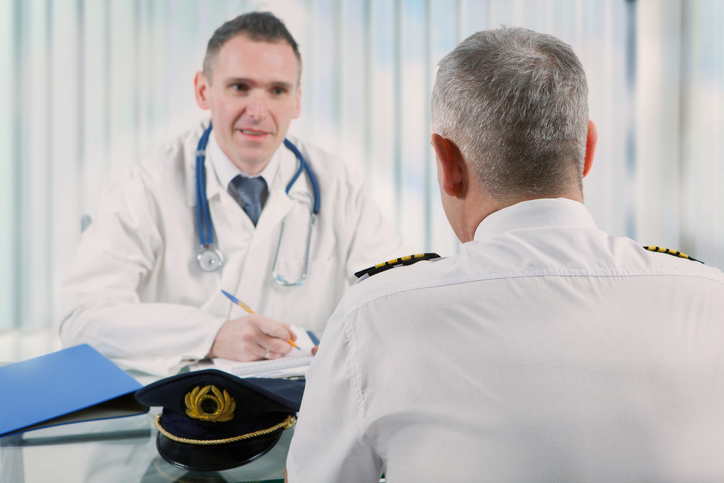
Obtaining FAA medical certification with hypothyroidism is possible. Achieving FAA medical certification with hypothyroidism will depend on the status of your condition. The Federal Aviation Administration (“FAA”) notes their concern with individuals who are experiencing potentially aeromedically significant symptoms such as fatigue, mental status impairment, or symptoms related to pulmonary, cardiac, or visual systems. As a result, if you are experiencing symptoms which may impair aviation safety, consideration with your doctor about mitigation of your symptoms is warranted prior to applying for a FAA medical certificate. If your hypothyroidism is effectively treated, however, the good news is that hypothyroidism is a CACI condition (which stands for Conditions AMEs Can Issue).
The FAA triages FAA medical certification with hypothyroidism in three ways: 1) applicants whose hypothyroidism is resolved; 2) applicants whose hypothyroidism is CACI qualified; and 3) applicants with primary or central hypothyroidism who are symptomatic.
Resolved Hypothyroidism
Applicants who have, according to the FAA, “resolved” hypothyroidism and are receiving no treatment may be issued a medical certificate by their Aviation Medical Examiner (“AME”) without requiring documentation. The FAA requires that in these cases the AME needs to be able to determine through history and examination that no treatment is necessary, that the applicant has no symptoms, and that the AME has no clinical concerns for the applicant. In order to establish these elements for the AME, it is recommended by our firm that consideration be given to your hypothyroidism before you present for examination with your AME. Although not required, providing a letter to your AME from your treating physician (primary care physician or endocrinologist) which highlights the above-referenced concerns, can go a long way toward giving your AME the necessary confidence in your history and current status.
CACI Qualified Hypothyroidism
Our practice perception is that the majority of applicants with primary hypothyroidism will fall within the CACI protocol. If upon examination your AME can determine that your hypothyroidism is qualified under the CACI protocol, your AME may issue to you an airman medical certificate. To achieve CACI qualification,
however, you must provide your AME with a “detailed clinical progress note” from your treating physician. The progress note from your physician should encompass the information desired by the FAA in the “CACI – Hypothyroidism Worksheet.” Therein, the FAA wishes to elicit the following information:
- Is your treating physician satisfied with your status? Essentially, the FAA wants to know whether your doctor thinks you are clinically stable.
- Are you showing any signs or symptoms of hypothyroidism? Again, the FAA wants to know whether you are experiencing any aeromedically concerning symptoms which could present a risk to aviation safety. If so, the FAA will want to know more about those concerns.
- Are you using acceptable medications to treat hypothyroidism? The FAA only accepts Levothyroxine sodium (Synthroid, Levothyroid), porcine thyroid (Armour), liothyronine sodium (Cytomel), or liotrix (Thyrolar).
- Is your TSH less than 10 (uIU/mL or mlU/L) within the last one year? The FAA will give you up to 9.9, but if your TSH is a 10, you will not be eligible for the CACI program.
You should make sure that this detailed clinical progress note from your treating physician is prepared, reviewed, and provided to your AME in advance of your FAA medical certification examination.
Symptomatic Hypothyroidism
Individuals with symptomatic hypothyroidism, with a TSH level of 10 (uIU/mL or mlU/L) or more, or those with central hypothyroidism due to a pituitary or hypothalamic disease face deferral by their AME. If your hypothyroidism is symptomatic, the FAA’s concern will be whether risk to aviation safety is effectively mitigated. The FAA may also go on a fact-finding mission to determine what is causing your symptomatic hypothyroidism, by requiring current lab work and imaging. It is our opinion that if you are symptomatic, you and your doctor should make all efforts to appropriately treat your hypothyroidism and any underlying causes prior to submitting an application for FAA medical certification. More discussion on this topic can be found at The Pilot Lawyer Podcast.
You need both a pilot and a lawyer on your side for your aviation law needs. Don’t hesitate to contact our team from The Ison Law Firm Aviation Lawyers to schedule a confidential consultation with an experienced aviation lawyer today.
We’re pilots representing pilots. The Ison Law Firm Aviation Lawyers offers FAA enforcement defense and medical certification representation worldwide!
The Ison Law Firm Aviation Lawyers
Phone: Toll-Free 855-322-1215
Office Hours: Mon – Thu, 9:00 AM to 5:00 PM
Fri, 9:00 AM to 12:00 PM
Disclaimer: Messages left for attorneys after these business hours will be addressed the following business day, during business hours.

